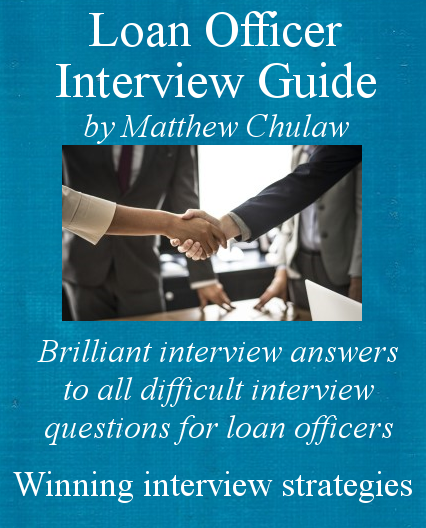Dear job seeker,
I will keep this page short and to the point. Here’s what I have for you today:

In the eBook, you will find multiple great answers to each of the following questions:
- Why do you want to work as a loan officer?
- How do you ensure you make no mistakes in your work?
- How do you deal with rejection in your job? How do you feel about rejecting a loan application of someone you like, or even know personally?
- Tell us more about your experience with underwriting software.
- How would you recognize if an applicant is telling truth to you, for example about their financial situation?
- What do you consider your greatest weakness as a loan officer?
- Have you done this job before? How many loans do you think you can close in a year?
- Describe a situation when you went above and beyond with your service (for the customer).
- See this pen on my desk (or other object). Try to sell it to me.
- Why should we hire you, and not one of the other applicants?
… and ten other tough questions you may get in your interview for a loan officer (or mortgage broker) job.
Check the sample to see how this book can help you:
Sample from the eBook
Question: How do you deal with rejection? How do you feel about rejecting a loan application of someone you like as a person?
Hint: Believe me: you’ll reject many more loan applications than you will approve. And you will also deal with other form of rejection—people not answering your calls, hanging up after a few seconds, not arriving to the meeting you’ve arranged, and so on, and so forth.
Resilience is an important quality for every good loan officer and interviewers try to find out whether you have the quality.
It would be a mistake to claim that you were an excellent salesman, and would not experience rejections. It simply doesn’t work like this. Oppositely, you should tell them that you are aware that you will hear no more often than yes, and that it does not discourage you from applying for the job.
To the second part of the question, you can simply say that you won’t let your emotions influence your decisions in work, and will treat a friend in a same way you’d treat any other client: if they do not meet the criteria, their application will be rejected. End of the story.
Sample answers
I can get over rejection rather quickly, because I see it as an unavoidable step on the road to success. I know that we have to hear NO many times on the phone, or even in the meetings, before we finally sign up a great client. That’s just how it goes, and I do not feel discouraged. In terms of rejecting an application of a friend, there are procedures we have to follow with every client—regardless of our relationship. If they do not meet the criteria, they won’t get the loan. Simple as that.
I’ve been doing sales for the past seven years, and experienced my share of rejections. I won’t lie to you—it’s never easy, especially if you invested a lot of time and effort to even get a meeting with certain prospect. But it’s just a part of the process, and one can’t take their rejection as something personal. Clients do not reject us—they reject our offer. That means we can try with another offer, and if that doesn’t work, we just have to move on… I plan to treat a friend, or even a family member, just like any other client. This is a responsible work and I don’t see any place for favoritism here.
Question: How would you recognize if an applicant is telling the truth, for example about their financial situation?
Hint: This is a tricky question, and you should avoid the common trap. Obviously we can watch someone’s eyes, their gestures, and we can read a lot from their body language. But these are no reliable methods to judge whether someone is telling us the truth. You can use them in a date, but not in a process of loan application :).
Say that you will always ask for documents. You won’t accept any number that’s not on a paper.
Depending on the type of clients you work with, you may need various documents, such as tax returns (typically for several years), pay slips, bank statements, cash flow statements, etc.
You can also say that you will check their trustworthiness by asking the same question several times, either in the same meeting, or in different meetings. Then you will compare their answers and see if they match.
Sample answers
I do not plan to rely on personal judgment. I will rely on documents. Their pay slips, bank statements, credit history, and so on. Of course, not everything can be quantified, for example their future plans. Do they plan to have the same job? Won’t their monthly expenses rise significantly in the near future (for example because they are going to have a child), and so on. We can question them about these things, but at the end of the day the process of loan application takes into account historical data, and not future plans.
I will simply compare their answers with the numbers from official documents. We can get these from their employers, from the credit registry, tax office, etc. We should not rely on body language or personal judgment, especially when dealing with such a sensitive issue as a loan application. I may still cross examine them, asking them the same question several times, or changing the wording but seeking the same answer. The way they react tells something about their trustworthiness, and can help us to make a picture of their reliability. But it is just secondary. Official documents and numbers should always play the prime in the application process.
End of the sample
These were just two questions. You will find 20 in the eBook, including difficult behavioral questions. And that’s not all.
To ensure you will get the job, I included in the book seven principles you need to understand before you can ace the interview for a position of a loan officer.
Without talking too much, let’s have a look at one o them:
Sample no. 2
Principle no. 2: Do your homework
A typical picture from an interview: You talk to a job candidate, and after first ten minutes you know (or at least feel) that they applied for several jobs, and know virtually nothing about your financial institution.
Does it really matter to know something about the bank where you want to work as a loan officer? To know something about their products, principal customers, history, values, etc?
To be honest, in terms of your readiness for the job (your skills, personality, knowledge, your abilities), it does not matter. Because you will learn everything important about them once they hire you.
But in terms of connecting with the interviewers, it matters a lot.
You should do your homework. Try to research particularly about the following:
- The history of the bank (briefly), their values and mission statement.
- Their core business and top products, the types of loans they work with.
- Things that make the place unique (or at least better), reasons why people should choose it for their place of work, or for a place where they apply for a loan.
- Reviews from former or existing employees (Glassdoor will help here).
- Any other information about the place and the job (such as a detailed job description etc).
Luckily we live in 21st century, and you won’t have to consult dozens of people to find the information. Online reviews, social networks, Google search, website of the company—all of them will tell you a lot about the place. Make notes, print them, and read them before the start of your interview.
Good research will help you in many ways.
It will help you find good answers to particular interview questions (questions that relate to the business and your job), to calm down before your interview (since it is always easier if we feel somehow familiar with the place and the people we will meet), and to come up with a good question, once there’s an opportunity to ask something.
When you know a lot about the place, or even about the people who interview you, you will always find something interesting to point out, or to discuss with them.
Ignorant candidates who rely only on their qualifications and interviewing skills, and do not do any research, are rarely hired.
Do not make the same mistake. Spend enough time researching about them. Make the unfamiliar familiar. It will help you immensely in your interview….
End of the sample

So that’s it. I do not want to waste your time with lengthy sales pages, and imaginary discounts or fake reviews, like other people do on their websites while trying to sell you something.
You have read the samples, you know what the eBook is about, and surely you can tell whether it will help you.
I sincerely believe it will help you. And you can read it easily in two or three hours, it’s 12,000 words. Only things that truly matter, no secondary content.
Plus, of course, like with everything else we sell here on InterviewPenguin.com, you have a risk free sixty days money back guarantee. If you don’t like this eBook for any reason, or no reason at all, just let me know (email me at matthew[at]interviewpenguin[dot]com) within 60 days and we will give you a full refund.
Quick Summary

- Brilliant answers to twenty difficult questions you may get in your interview for a loan officer (credit officer, mortgage broker) job.
- More answers to each question (two to four), so you can choose one that reflects your values and experience.
- Seven principles of acing the interview, things you simply need to know in order to make the right impression on the hiring managers.
- Instant download, .PDF format (you can read it on any device (mobile, kindle, PC), and you can easily print it).
- Secure and simple checkout with PayPal, you can pay with your credit/debit card, or with your PayPal account.
- Price: $19.95, one time payment, no hidden fees or upsell. 60 days risk free money back guarantee. Sold exclusively on InterviewPenguin.com.
- Click the checkout button below to proceed to the payment.
(After the payment you will be directed back to our website, to a protected page, to download your eBook. You will also receive a download link and instructions to your email, just to ensure that you will get the book without waiting, even if the redirect fails.)
That’s it. Your interview does not have to be stressful, or difficult. You can interview with confidence, and give brilliant answers to all tough questions. Download the guide today, and succeed in your interview for a job of a loan officer.
Sincerely,
Matthew Chulaw, Your personal job interview coach
P.S. Send me a message if you have any questions. I try my best to answer all messages within twelve hours (matthew[at]interviewpenguin[dot]com). Thank you!
